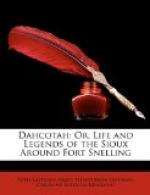There was one thing, however, that troubled the Dahcotah; he could not turn his mind from it, and day after day passed without relieving him from his perplexity. His beautiful wife never ate with him. When he returned in the evening from hunting, she was always glad to see him, and while he rested himself and smoked, she would cook his meat for him, and seem anxious to make him comfortable. But he had never seen her eat; and when he would tell her that he did not like to eat alone, and beg her to sit down and eat with him, she would say she was not hungry; and then employ herself about her wigwam, as if she did not wish him to say any more about it.
Chaske made up his mind that he would find out what his wife lived upon. So the next morning he took his bow and arrows, as if he were going out on a day’s hunt. After going a short distance from the lodge, he hid himself in the trees, where he could watch the motions of his wife.
She left the lodge after a while, and with an axe in her hand she approached a grove of poplar trees. After carefully looking round to satisfy herself that there was no one near, she cut down a number of the small and tender poplars, and, carrying them home, ate them as if she enjoyed them very much. Chaske was infinitely relieved when he saw that his wife did eat; for it frightened him to think that she lived on nothing but air. But it was so droll to think she should eat young trees! surely venison was a great deal better.
But, like a good husband, he thought it was his duty to humor his wife’s fancies. And then he loved her tenderly—he had given up country and home for her. She was so good and kind, and her beautiful hair! Chaske called her “The Mocassin Flower,” for her golden ringlets reminded him of that beautiful flower. “She shall not have to cut the trees down herself,” said Chaske, “I will bring her food while she prepares mine.” So he went out to hunt, and returned in the evening; and while his wife was cooking his supper, he went to the poplar grove and cut a number of young trees; he then brought them to the lodge, and, laying them down, he said to his wife, “I have found out at last what you like.”
No one would suppose but that the beaver-woman would have been grateful to her husband for thinking of her. Instead of that, she was very angry; and, taking her child in her arms, she left the lodge. Chaske was astonished to see his gentle wife angry, but he concluded he would eat his supper, and then follow her, hoping that in the meantime she would recover her good temper.
When he went out, she was nowhere to be seen. He called her—he thought at first that she had hid herself. But, as night came on, and neither she nor the child returned, the deserted husband grew desperate; he could not stay in his lodge, and the only thing that he could do was to start in search of her.
He walked all night, but saw no trace of her. About sunrise he came to a stream, and following it up a little way he came to a beaver dam, and on it sat his wife with her child in her arms. And beautiful she looked, with her long tresses falling into the water.




